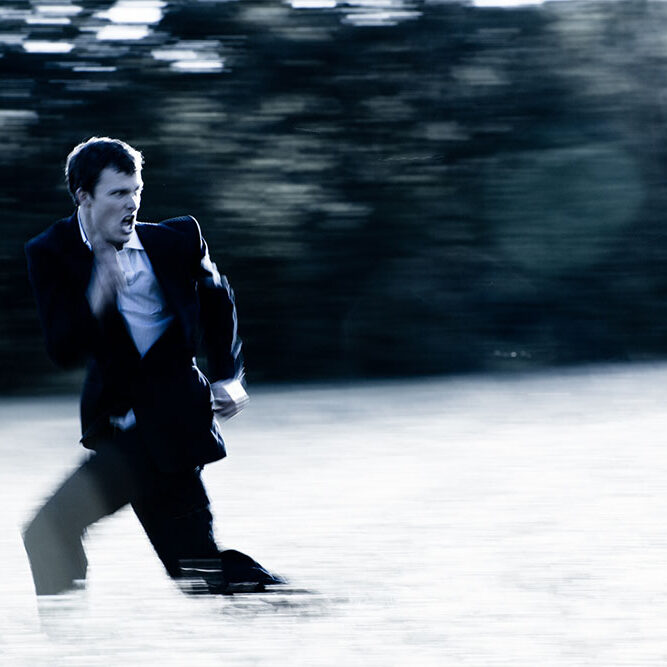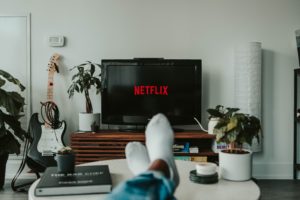
Fight or Flight?
Which One Are You Choosing?
Which one are you choosing?
Did you know you’re making this decision almost every minute of every day?
I had no idea I was choosing to run away, and I had no idea I was choosing to run so often.
What was I running from?
I don’t mean to imply I was facing life and death situations every minute of every day.
I wasn’t defenseless and living in the jungle or deep in the forest and running from lions or bears.
But I was running, and it was because I was afraid.
The thing that I feared the most, the thing that keeps coming up in all of our lives all day long, the unavoidable reality of being a thinking human is our thoughts lead to feeling emotions.
I had been running from every uncomfortable emotion I experienced since I was a teenager.
If I felt embarrassed, I ran.
If I felt insecure, I ran.
If I felt judged, I ran.
If I felt shame, I ran.
I ran from each and every unwanted emotion I had all day long.
Of course, I don’t mean I physically ran out of the room when I felt an uncomfortable emotion.
I ran a different way.
I put emotional distance between me and the thing I didn’t want to feel.
I gave my mind something to focus on to avoid feeling the disturbing emotion.
We all do it very well and in many, many different ways.
Most of the time, we aren’t even aware we’re doing it.
We numb ourselves and distance ourselves from our emotions by engaging in activities like watching tv, reading, or focusing on work.
I’m not saying choosing to work late, reading a book, watching tv, or browsing your favorite social media platform is a bad thing, and you shouldn’t ever do it.
(Photo by Mollie Sivaram on Unsplash)
I am saying that choosing to do these things to avoid experiencing an uncomfortable emotion can develop into a potentially harmful avoidance behavior pattern.
Most of the early activities we engage in to distract ourselves aren’t inherently wrong, and many are healthy activities we have to engage in for at least part of our day.
Because these are “normal,” everyday activities, we’re unlikely to take a deeper, more honest look at our motivation for engaging in them.
We don’t admit to ourselves that we’re still at work because we don’t want to think about and feel an uncomfortable emotion from a life event that happened earlier that day or in the past.
We ignore the truth and focus on a more pleasant thought like we’ve chosen to work late because we’re dedicated to our jobs.
Due to our reluctance to be completely honest with ourselves, most of us never become aware of our habit of running from our emotions.
The potential for actual harm can occur when the intensity of the emotions we’re trying to avoid increases dramatically, and we find our go-to avoidance behavior isn’t strong enough to distract us sufficiently.
The more intense the unwanted emotion is we’re trying to avoid, the more intense the avoidance behavior needs to be to mask the feelings we don’t want to feel.
The intensity of this new, more powerful running behavior has consequences that begin to bleed into other areas of our lives, resulting in our first honest evaluation of our behavior and motivation for it.
This evaluation reveals that our new, more intense avoidance behavior is causing an equally high or greater level of discomfort than what we’re trying to run from.
So we begin to question what we’re doing and why.
This may be the first time we see our avoidance behavior as a problem and not the benefit we intended.
Unfortunately, this evaluation and realization cause more discomfort, and the pattern of avoidance behavior we’ve already established just leads to more intense running instead of a conscious decision to change.
Instead of running from our emotions by reading or watching television all evening, the need for a more intense form of avoidance behavior leads many of us to engage in over drinking, overeating, or taking drugs.
We discover consuming a few drinks, eating a bag of chips, or smoking a joint provides the extra boost we need to create temporary distance from the new, more intense unwanted emotions of the day.
(Photo by Olga Kozachenko on Unsplash)
This works great at first.
We get the results we think we want, but repeatedly following this pattern leads to additional thoughts and feelings we believe we need to avoid.
The choice we made in selecting our new avoidance behavior leads to new thoughts and feelings of shame and guilt.
So what do we do?
Avoid feeling the guilt caused by our decision to drink, overeat, or take drugs by drinking more, overeating more, or taking more drugs.
A repeated pattern or cycle of behavior is established that can become very difficult to break.
- Have a life experience.
- Think uncomfortable thoughts that result in unwanted feelings.
- Run from the emotions by drinking, eating, or taking drugs.
- Create temporary distance from unwanted emotions.
- Add new negative feelings about our choice of avoidance behavior.
- Have new life experiences.
- Think uncomfortable thoughts about new experiences that result in negative feelings.
- Combine unwanted new feelings with original unwanted feelings and added new ones about our avoidance behavior choice.
- Have uncomfortable thoughts about all of it.
- Run from everything by drinking more, eating more, or taking more drugs.
- Create temporary distance from unwanted emotions.
- Add even more new negative feelings about the source of “relief.”
- Carry everything with us.
- Wash. Rinse. Repeat.
Once I developed the habit of running instead of feeling, my routine became so entrenched, familiar, and comfortable that I used it to run from even the most trivial emotional life experiences.
The actual harm came from the unavoidable intensification this pattern needed to sustain itself.
You know the routine.
One or two beers becomes three or four, which becomes four or five plus a joint and bag of chips, and on and on it goes.
It was what I knew, and its familiarity made it feel safe.
As a result, I chose to follow this pattern even though I didn’t want to.
I chose to continue to follow it even though I knew everything was getting worse.
It was easier to choose something I knew was worse than to choose something I didn’t know that may or may not be good.
Fear of the unknown, combined with the need for the safety we find in familiarity, overpowers any logical decision to change our behavior.
This is why many of us describe our drinking, overeating, or drug use as something beyond our control.
We feel as though we are on autopilot.
We believe we have no choice, and change is impossible.
I wanted something else for my life other than the results I was getting from running all the time, but I didn’t know how to achieve it and was afraid to try.
The battered spouse example best illustrates this fear of changing from the unwanted-known to the wanted-unknown.
I often use this example to explain what I’m talking about because it’s familiar to everyone.
We’ve all heard it before and understand it and don’t understand it at the same time.
The battered spouse always goes back home because they fear the wanted unknown of what leaving would bring more than they fear the unwanted-known of returning home.
(Photo by Ján Jakub Naništa on Unsplash)
From the outside, it’s easy to judge and say I don’t understand how they could go back.
But when you take a minute to understand the power of the fear of the unknown, it makes complete sense.
The power of the primitive brain is tremendously strong.
However, you can use deliberate prefrontal cortex thinking to overpower it.
Eventually, I learned how to do this, and so can you.
As I said earlier, I’ve been running from every uncomfortable emotion for most of my life.
It was clear that running wasn’t working, but what surprised me most was learning that I didn’t need to fight my emotions either.
I learned there is another way to think about these experiences.
I realized there is an incredible benefit to simply accepting you’re experiencing an uncomfortable feeling and just allowing the emotion to exist.
I learned to let the feelings be there without fighting or judging them.
I learned how to accept these feelings without resisting, avoiding, or changing them.
I learned how to choose to be at peace with these emotions even though they aren’t the emotions I prefer to feel.
I learned something that isn’t taught in school.
I learned something invaluable about “negative” life experiences, “negative” feelings, and “negative” emotions.
True self-confidence and growth come from our willingness to experience ANY emotion.
Shame and failure come from running away.
Your feelings can’t hurt you,
but what you choose to do with them can.
This new way of thinking, accepting, and allowing myself to experience any negative emotions without resistance or avoidance is the most challenging life lesson I’ve experienced.
But it’s also the most valuable.
I’m still learning, and I probably won’t ever be “perfect” at it.
But that doesn’t matter at all.
The truly valuable thing is just being aware of my thoughts and the feelings my thoughts are causing me to experience.
Being aware and allowing my emotions to exist gives me the opportunity for honest reflection, evaluation, and growth.
Just feel the feeling.
That’s it.
When you run, you learn nothing.
When you run, you don’t grow.
When you run, you fail.
There is no lasting benefit.
There are only negative consequences.
Growth is uncomfortable too, but it empowers you to improve yourself and your life.
It allows you to move forward.
Choose to feel uncomfortable.
Choose to grow.
Feel your feelings.
They aren’t there to hurt you.
They’re there to help you.
Let them.
Click this link to learn how to work with me
so you can stop running, grow, and improve your life today.



